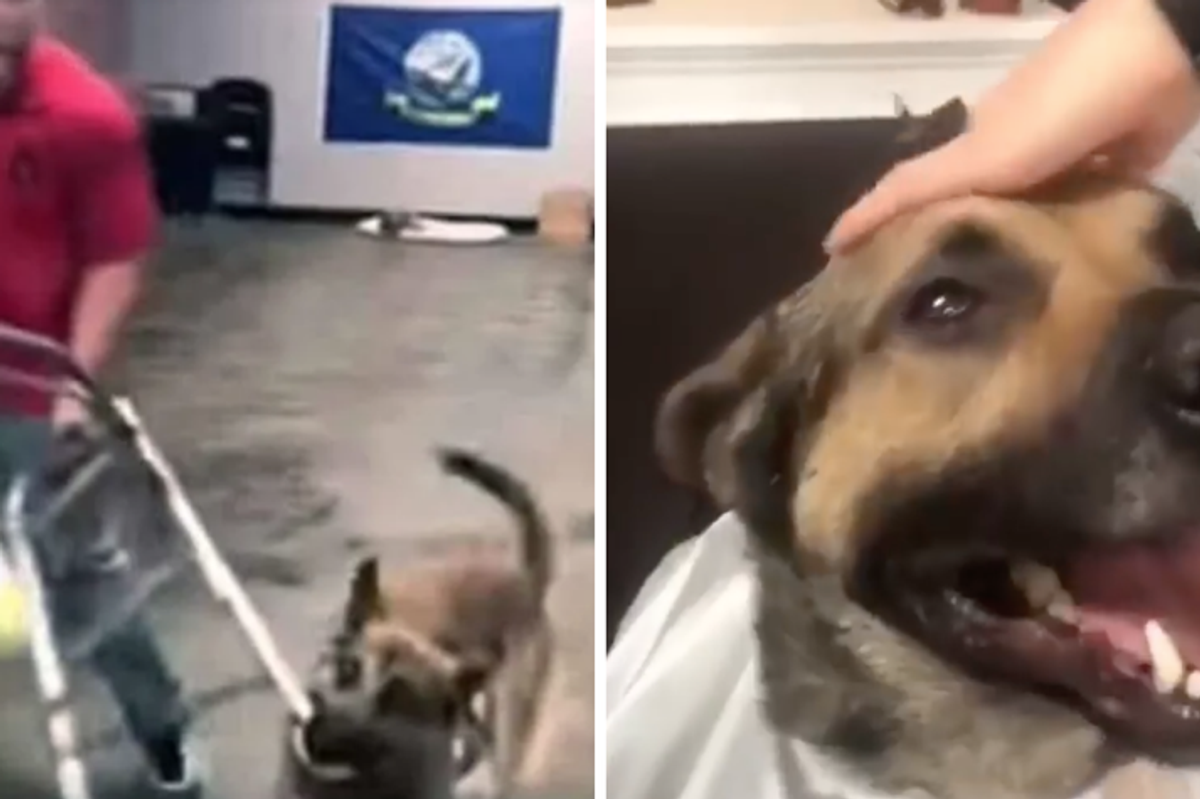Service dog epically fails every single test at training school, and people love him for it
"Being a service dog was not his purpose in life..."
Service dog flunks out of training school in spectacular fashion
There are lots of different kinds of service and companion dogs. Some are "seeing-eye" dogs that assist people with visual impairments. People with mobility issues, hearing loss, or who are at risk of seizures might benefit from a service dog to help them and keep them safe. People with autism, PTSD, anxiety, or depression can also benefit from a highly trained canine companion.
Regardless of the task, certified service animals must undergo an extremely rigorous training process. Their job is not an easy one, and they need to prove they're capable and not prone to being distracted. No one knows this better than the folks at Double H Canine Academy in Louisville, Kentucky, a training facility for pups.
The team at Double H also recognizes that not every dog is suited for a life of service. In a hilarious viral video posted to YouTube, it's abundantly clear that not all dogs are meant to follow orders.
Ladies and gentlemen, meet Ryker. He's a Belgian Malinois who was a student at Double H, trying to earn his service dog bona fides (bone-a-fides?). Unfortunately, Ryker flunked out in such spectacular fashion that the team couldn't help but put together a little "highlight" package of his best moments.
Ryker really tries his best, but the poor guy just can't help himself. He doesn't want to work; he wants to play. Ryker steals a tennis ball from the bottom of a walker, drags around an entire wheelchair by its handle, and pulls his trainer over trying to go after a fetch ball. There is no piece of equipment that he doesn't want to chew or climb on. There is no leash that can contain him. There is literally not a single distraction that he will not fall for. Perhaps his most extreme fail happens when Ryker tries to open a refrigerator door, and instead ends up dragging the entire thing halfway across the room.
Definitely not service dog behavior. Watch his contagious, fun-loving spirit in the video here:
- YouTube www.youtube.com
The video racked up over 2 million views, and commenters agreed: Ryker may not have passed, but he was definitely a certified Very Good Boy.
'Why bring one thing from the fridge when you can bring the whole damn thing"
"Frankly, I don't understand why he didn't pass. I mean he folded the wheelchair up. He removed the walker from the person after they clearly were done with it. He washed the floor. He moved the fridge. What more could you ask of him?"
"My family and I adopted a service academy 'drop-out' ten years ago. He's still with us and is the most AMAZING dog I'll ever have."
"Being a service dog was not his purpose in life... still a good boy, his purpose was to give us laughs."
"On the plus side, if you lose a tennis ball Ryker is your dog!"
In Ryker's defense, only about 40-50 percent of dogs enrolled in service dog programs ultimately graduate on average, making his dropout pretty normal. But while he may never be the world's greatest service dog, he continues to provide an invaluable testament to being true to oneself.
- YouTube www.youtube.com
The list of skills that service dogs can have is astounding. Not all dogs will acquire all of these skills, but some of the basics are:
- Carrying things for their owner
- Guiding their owner safely
- Waking their owner
- Waking their handler and/or helping them up
- Interrupting dissociating or freezing
- Find their owner if lost
- Alerting bystanders, calling for help, or even using a dog-friendly phone to contact emergency services!
- And so many more

The fact that Ryker has had any training at all makes him exceptionally well-suited to civilian life. As a family house-dog, Ryker won't need any of the skills above, but his abundance of love and playfulness will serve him incredibly well with his forever family. And his viral bloopers continue to remind us that sometimes, the most meaningful gifts a dog can offer are laughter, presence, and unconditional love. In that sense, Ryker found exactly the life he was meant to live.
This article originally appeared five years ago. It has been updated.
- Four guys asked their new neighbor if they can walk her dog, and the dog wrote back ›
- Four guys asked their new neighbor if they could walk her dog. Then the dog wrote back. ›
- Family posts a very chill note to neighbors explaining why their dog is on the roof ›
- Service dog is 'reunited' with favorite Disney character on a cruise and short-circuits with joy - Upworthy ›

